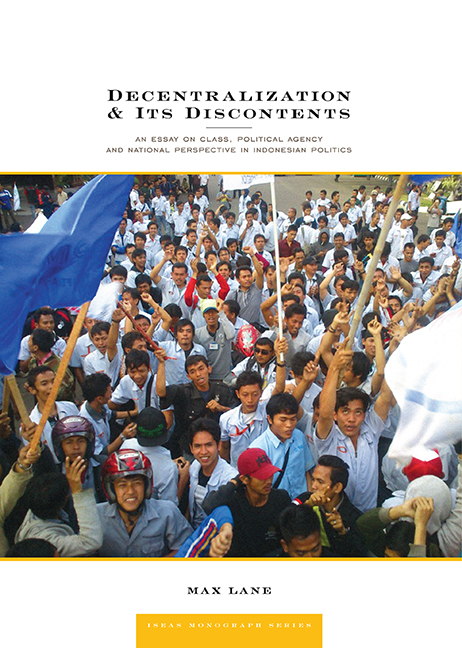 Decentralization and Its Discontents
Decentralization and Its Discontents Book contents
- Frontmatter
- Contents
- Editorial Note
- Preface
- About the Author
- Introduction
- I The Enigmatic Emergence of Decentralization
- II The Political Economy of Desentralisasi
- III Decentralization: Its Discontents
- IV National Agency in a “Co-ordinative State”: The Future of Decentralization
- Conclusion
- Endnotes
- References
III - Decentralization: Its Discontents
Published online by Cambridge University Press: 21 October 2015
- Frontmatter
- Contents
- Editorial Note
- Preface
- About the Author
- Introduction
- I The Enigmatic Emergence of Decentralization
- II The Political Economy of Desentralisasi
- III Decentralization: Its Discontents
- IV National Agency in a “Co-ordinative State”: The Future of Decentralization
- Conclusion
- Endnotes
- References
Summary
In assessing the impact of desentralisasi, it can be viewed in at least two ways — as a manifestation of a change in the political balance flowing from changes in the political economy or as the implementation of a (technocratic) policy to improve economic and social development. The analysis in the previous two chapters presents the emergence of decentralization as primarily a manifestation of changes in the political side of the political economy. In an under-industrialized economy comprising a plethora of small- and medium-sized local capitalists and a tiny conglomerate sector (for the size of the country), the end of the crony regime and the consequent privileged position of crony capital has unleashed a dynamic giving more room to move for the smaller, local capitalists. This is the essence of desentralisasi. It is the basis for a more anational political format.
Perhaps anational is a difficult concept to use. The Indonesian nation, as a stable community inhabiting clear borders (though disputed in western Papua), with a common language, economic and cultural life, certainly continues to exist, even if with lowered expectations for itself than previously held. There is a national government which, despite desentralisasi, controls the majority of the nation's state revenues and sets the policy frameworks, in which local governments must operate. It is perhaps also further complicated by the dominance of classical liberal and neo-liberal economic policy thought in Indonesia, which emphasizes market mechanisms rather than intervention by the national state. This may not be so much a complicating factor, but rather a reinforcing factor. In the absence of a strong national social class providing direction for the nation, an ideology emphasizing a smaller role for the state finds a comforting environment at elite levels. The New Order government may have pursued an agenda which included prioritizing protecting the privileges of crony capitalists but the powerful character of the core military rule established in the 1960s and 1970s also meant that it could impose a national direction.
- Type
- Chapter
- Information
- Decentralization and Its DiscontentsAn Essay on Class, Political Agency and National Perspective in Indonesian Politics, pp. 51 - 70Publisher: ISEAS–Yusof Ishak InstitutePrint publication year: 2014


